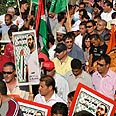
The next disengagement
Arab-Israeli citizens are losing their faith in the State with each day that passes
This appears to be a mere legal and technical issue: The Police Investigation Committee, which decided not to charge anyone for the deaths of Arab-Israeli civilians in the October 2000 riots, claimed it lacked sufficient evidence to formulate an indictment which could lead to a conviction.
All those who protested against the decision had to use tapes or written testimonies to prove their arguments. But even those who did manage to collect any shred of evidence possible, found it to be a difficult task. The Police Investigation Committee, like the whole Israeli political establishment, is hiding behind irrelevant arguments that have nothing to do with the matter at hand.
Shimon Shamir, who was a member of the Or Commission, put this in the simplest words: It is inconceivable that no one is held responsible for the deaths of 13 civilians.
But a significant portion of the Jewish public in Israel is convinced that the October 2000 events were not only about Arab demonstrations, but rather an insurrection against Israeli society, aimed at disintegrating it and assisting the enemy in defeating it.
Arabs not considered citizens
From this perspective, the facts are unimportant. They matter only when a civilian is concerned, a civilian whose violent death cannot go by without an investigation or without finding those who are responsible. In the State of Israel, an Arab is not a citizen.
In his testimony to the Or Commission, David Zur, now Tel-Aviv District Police chief, said that a police officer on his way to confront Arab protestors believes the Arabs consider him to be their enemy. The police officers who were deployed in Um al-Fahem and Faradis did not think of themselves as law enforcers on their way to restore order, but rather as people who are about to face an enemy – whether this is how they perceived the Arabs, or how they believed the Arabs perceived them.
The demonstrators, for their part, did not think of the police officers as law enforcers, but as those who symbolize the extent to which they are not considered to be citizens.
The problem of identity
And this is the truly serious matter - the spark that could kindle a great fire: The question of what makes the Arab a citizen, and what makes Israel his state. We wiggle around this question not only because it is complex and hard to untangle, but also because it touches 1,001definitions that Israel avoids.
What is Israeli citizenship? Who does it include? What kind of an umbrella can host under it both Arabs and Jews, orthodox Jews and seculars, those who think of Israel as a state like any other and those who see it as the beginning of the Messiah's return?
No government had ever dared confront this question. It is doubtful whether Ariel Sharon or any of his predecessors had ever held even one government meeting on the subject, gave it one little thought, dedicated to it five minutes at the legendary advisors' forum.
It is much more convenient to politically feed on fear and hate – aimed at the Arabs outside of Israel , and the Arabs living in it; aimed at those different from you in their religion, economic status or worldview. It was much easier for Alik Ron, who was Chief Commander of the Northern District Police during the October riots, to send out the police officer to stand in the front line of the problem, armed with weapons, but backed up by nothing.
The leaders of the Arab public are also party to this crime. They entrench themselves behind just complaints of discrimination, and continuously present themselves as the representatives of a minority.
And so, as each day goes by, both leaderless publics move further apart, toward complete separation.
A ticking bomb?
During his term as Shin Bet chief, Ami Ayalon convinced High Court of Justice President Aharon Barak to appoint an Arab judge to the High Court, saying that the Arab public is losing its faith in the Israeli justice system.
Ever since then, with each passing day, the Arab public loses a bit more of its trust in one Israeli system or another. The Arabs are creating their own separate, parallel systems, a parallel ethos, and a sense of exiled citizenship instead of the one which had not been given to them.
But this division will not, like the disengagement, be completed within a week's time. It will, as the phrase goes, eventually blow up in our face.
Ofer Shelah is a regular Ynet commentator on political and military affairs










